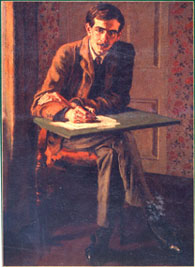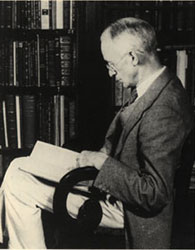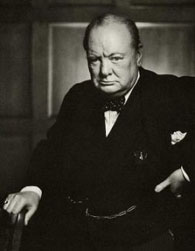Traditions & Culture of Collecting Tailpieces
 John Maynard Keynes
John Maynard Keynes(portrait by Duncan Grant)
John Maynard Keynes, “On Reading Books,” broadcast on the BBC on 1 June 1936
May I conclude with a little general advice from one who can claim to be an experienced reader to those who have learnt to read but have not yet gained experience? A reader should acquire a wide general acquaintance with books as such, to speak. He should approach them with all his senses; he should know their touch and their smell. He should learn how to take them in his hands, rustle their pages and reach in a few seconds a first intuitive impression of what they contain. He should, in the course of time, have touched many thousands, at least ten times as many as he really reads. He should cast an eye over books as a shepherd over sheep, and judge them with the rapid searching glance with which a cattle-dealer eyes cattle. He should live with more books than he reads, with a penumbra of unread pages, of which he knows the general character and content, fluttering round him. This is the purpose of libraries, one’s own and other people’s, private and public. It is also the purpose of good bookshops, both new and secondhand, of which there are still some, and would that there were more. A bookshop is not like a railway booking-office which one approaches knowing what one wants. One should enter it vaguely, almost in a dream, and allow what is there freely to attract and influence the eye. To walk the rounds of the bookshops, dipping in as curiosity dictates, should be an afternoon’s entertainment. Feel no shyness or compunction in taking it. Bookshops exist to provide it; and the booksellers welcome it, knowing how it will end.
 “Noodles” Norman
“Noodles” NormanGeorge Graham Vest
Gentlemen of the Jury: The best friend a man had in the world may turn against him and become his enemy. His son or daughter that he has reared with loving care may prove ungrateful. Those who are nearest and dearest to us, those whom we trust with our happiness and our good name may become traitors to their faith. The money that a man has, he may lose. It flies away from him, perhaps when he needs it most. A man’s reputation may be sacrificed in a moment of ill-considered action. The people who are prone to fall on their knees to do us honor when success it with us may be the first to throw the stone of malice when failure settles its cloud upon our heads. The one absolutely unselfish friend that man can have in this selfish world, the one that never deserts him, the one that never proves ungrateful or treacherous is his dog. A man’s dog stands by him in prosperity and in poverty, in health and in sickness. He will sleep on the cold ground, where the wintry winds blow and the snow drives fiercely, if only he may be near his master’s side. He will kiss the hand that has no food to offer; he will lick the wounds and sores that come in an encounter with the roughness of the world. He guards the sleep of his pauper master as if he were a prince. When all other friends desert, he remains. When riches take wings, and reputation falls to pieces, he is a constant in his love as the sun in its journey through the heavens.
If fortune drives the master forth an outcast in the world, friendless and homeless, the faithful dog asks no higher privilege than that of accompanying him, to guard him against danger, to fight against his enemies. And when the last scene of all comes, and death takes his master in its embrace and his body is laid away in the cold ground, no matter if all other friends pursue their way, there by the graveside will the noble dog be found, his head between his paws, his eyes sad, but open in alert watchfulness, faithful and true even in death.
 Dr. Cushing and his books
Dr. Cushing and his booksFrom The Doctor & His Books by Harvey Cushing, 1926. Printed at The Arion Press for the May 1982 meeting of the Roxburghe Club of San Francisco, addressed by Arthur Lyons, M. D.
This may after all be the right track: to warn young people against books or at least against book collecting, for one may easily become enslaved and enveloped by books. In fact, beware of books. Some biologist has stated that if Nature could take her course, unimpeded, the world would be populated with elephants wallowing about knee deep in a seething mass of mice. This man knew nothing of books. As a species they are imperishable, and against their multiplication Nature has no chance whatsoever. The time will come when every tree has been felled for paper, every calf for leather and the few long-haired and ill-nourished people left in the world will be madly making card indices of the volumes which have filled every available cranny in which they can be stored. Laws will have been passed against their importation—only a quota of the French, German, Italian and Polish books to be admitted each year. For should you happen to leave a pair of foreign books alone on a shelf in the state known as their original wrappers, they breed with astounding rapidity.
 Winston Churchill
Winston ChurchillFrom The Wit and Wisdom of Winston Churchill: A Treasury of More than 1,000 Quotations and Anecdotes, ed. James C. Humes (1994).
There is a great deal of difference between the tired man who wants a book to read and the alert man who wants to read a book.
There is a good saying that when a new book appears one should always read an old one.
If you cannot read all your books, at any rate handle, or as it were, fondle them—peer into them, let them fall open where they will, read from the first sentence that arrests the eye, set them back on their shelves with your own hands, arrange them on your own plan so that if you do not know what is in them, you at least know where they are. Let them be your friends, let them at any rate be your acquaintances.
Books in all their variety are often the means by which civilization may be carried triumphantly forward.
back to top
